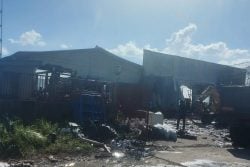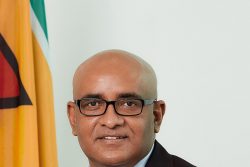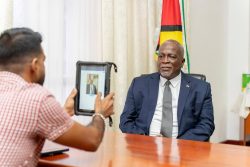CARACAS, (Reuters) – Weeks after his death, Venezuelan socialist leader Hugo Chavez still leads supporters in singing the national anthem.
The late president’s recorded voice booms over rallies for his protege, acting President Nicolas Maduro, who stands under billboards of Chavez’s face and waves to crowds carrying signs emblazoned with his name.
Maduro, who is favored to win a snap election triggered by Chavez’s death last month, rarely misses a chance to lionize the man many Venezuelans know as “El Comandante.”
“All of the prophecies of Hugo Chavez, the prophet of Christ on this earth, have come true,” intoned Maduro at a rally celebrating the anniversary of the former president’s release from jail for leading a failed 1992 coup.
“In eternity, or wherever you are, you must be proud because you left our people the greatest inheritance of all: a free and independent nation on the path toward socialism,” he said of the man loved by supporters as a savior but excoriated by adversaries as a dictator

Seeking to tap into the emotional outpouring following his death, Maduro’s presidential campaign has put Chavez’s image on nearly everything except the ballot.
From thundering speeches celebrating Chavez’s days as a leftist military conspirator to stories told in a low voice of his final days suffering from cancer, Maduro has made Chavez’s ghost the centerpiece of his campaign.
Polls show the 50-year-old former bus driver, whom Chavez named his successor before dying, leading opposition challenger Henrique Capriles by at least 14 percentage points.
He enjoys ample state spending to back his candidacy, and has used the celebration of Chavez’s legacy to keep attention away from high inflation, nagging product shortages and one of the world’s highest rates of violent crime.
BALLOONS SENT TO CHAVEZ
At one rally, a symbolic dividend check from a telephone company that Chavez nationalized was tied to red helium balloons and released into the sky to thank him for a wave of state takeovers that put much of the economy under state control.
“This is a present for the person who most deserves it, the person who created this economic and social system to take us toward socialism,” Maduro said, in a rally at the steps of the presidential palace. “There it goes, for our Comandante Chavez!”
He nearly always speaks to the backdrop of a large picture of Chavez. Some now include the words “To Maduro, from all my heart,” above Chavez’s signature.
The recording of Chavez singing the anthem usually ends with him shouting “Long live Venezuela!” to a background of cheering, then cuts to an awkward silence before Maduro speaks.
Adding to the seeming ubiquity of Chavez’s persona still in Venezuela, state TV frequently plays a cartoon of him arriving in a green field, representing the after-life. A smiling Chavez is greeted by Venezuelan independence heroes and deceased leaders of the Latin American left including Argentina’s Ernesto “Che” Guevara and Chile’s Salvador Allende.
Though not as omnipresent, the shadow of Chavez also falls large on the opposition campaign.
Crisscrossing the country in a campaign similar to his unsuccessful 2012 bid against Chavez, youthful opposition candidate Capriles frequently invokes him too – but to try to belittle Maduro as a non-entity and pale imitation of his former boss.
“Nicolas, you are not Chavez!” he says.
Opposition strategists and supporters are intimidated and disgusted at what they see as the crass exploitation of the deceased leader’s name by the government.
“They should let him rest in peace now. In our country, we don’t stir up the dead, we leave them quiet to enjoy their eternal rest,” said Elmira Pereira, 33, a shopkeeper in southern Bolivar state attending a Capriles rally.
“Maduro should have the courage to campaign on his own.”
Opposition leaders say the latest clutch of opinion polls were taken in the immediate aftermath of Chavez’s death, and they hope that new surveys due in coming days will show Capriles closing the gap as the sympathy factor wears off.
Chavez’s corpse is in a military museum in the 23 de enero hillside slum overlooking the presidential palace and supporters still line up to pay their respects at his closed casket.
‘NO ONE LIKE CHAVEZ’
Maduro launches his formal campaign on Tuesday with a caravan from Chavez’s home town in the central plains to the presidential palace, mirroring the former soldier’s ascent from childhood in a mud-floored hut to a global leader of the left.
He will start the tour by driving a bus to play up his working class roots and thumb his nose at critics who say a bus driver is incapable of running a country.
Though the fresh memories of Chavez may win him the vote, Maduro faces a tricky task beyond April 14 putting state finances back in order after blowout election-year spending in 2012 and balancing a disparate coalition that for years was kept in line by the sheer personality of the president.
Maduro’s rallies usually open with the euphoric shouting of a well-known soap opera actor and television game show host who for years worked at a station that Chavez shut down in 2007 but this year announced he was backing the government.
A group of musicians and actors, often associated with the opposition, also recently announced their support for Maduro. And the section of Chavez’s last public speech in which he endorsed Maduro as his successor should he die of cancer is played over and over at government rallies.
Maduro, though, still struggles to match Chavez’s natural charisma, leaving him constantly invoking the late leader.
In a broadcast from a state-backed home appliance factory, Maduro played a video of Chavez describing plans to build the facility as he scrawled in typical style on a map of the region.
“And here we have in our hands the same map that Commander Chavez was working with that day,” Maduro said, proudly displaying it to the camera. “You can see here the dots and the circles, for the construction of these factories. He left us the calculations, he left us everything.”
His own conversations with housewives and factory workers appear stilted in comparison to his former boss’s spontaneous chats with supporters.
“Venezuela will never have another president like Chavez, we could have one that tries to be like him or follows what he did, but no one like Chavez,” said Fiama Barrios, 21, a supermarket cashier, at a Maduro rally in the poor west end of Caracas.
“As for Maduro I can’t say, because he hasn’t shown himself in the presidency. But we are going to insist he fulfill Chavez’s legacy.”





